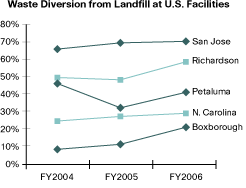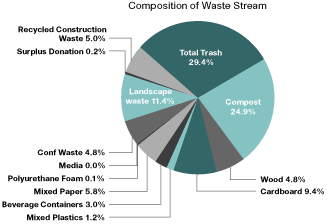In Cisco's primarily office-based operations, we strive to minimize our environmental footprint. We focus on several operational issues:
- Reducing water use
- Purchasing from local farmers
- Managing the waste generated as a result of our operations
Reducing Water Use
Water scarcity is becoming an increasingly important issue worldwide due to changing weather patterns and population growth. At our California headquarters, Cisco is helping to relieve demand on scarce water resources by using recycled water where possible, while reducing overall demand for water. Water conservation efforts benefit the environment and reduce our operating costs.
This year we tested six waterless urinals in restrooms at our San Jose headquarters, and found that each saved an estimated 20,000 gallons per year. In FY2007, we will replace 425 additional urinals, for an estimated savings of 8.5 million gallons of water per year. In addition, because approximately 30 percent of our water consumption goes to landscape irrigation, we are using only recycled water for this activity. Through our efforts in California alone, we are saving more than 81 million gallons of water each year.
Sustainable Food Service
Bon Appetit manages all 15 of Cisco's cafeterias in the United States and Canada. The cafeteria management company's Farm to Fork Initiative means the company purchases seasonal and regional produce from local farmers within a 150-mile radius of campus and serves it within 48 hours of harvest. The result is superior flavor and nutritional value as well as reduced emissions associated with transport.
Other ecologically sound purchasing decisions made by Bon Appetit include purchasing meat and dairy products free of growth hormone and antibiotics. In addition, Cisco's cafeterias purchase locally sourced fish when available and follow the Monterey Bay Aquarium Seafood Watch guidelines for sustainable seafood, designed to protect the ocean from overfishing. For example, salmon served in our cafeterias is wild, not farmed, and tuna served is caught with dolphin-safe techniques.
Our cafeterias also participate in composting and recycling programs. In our North Carolina facility, our waste vegetable oil is converted to biodiesel for use in powering traditional diesel vehicles.
Managing Waste
Cisco strives to manage, reduce, or eliminate operational wastes whenever possible. This waste includes all office, landscaping, and cafeteria wastes, but excludes electronic waste (for information about ways Cisco reduces electronic waste, see the section on Lifecycle Management). We continue to maintain a high recycling rate and divert waste to areas where it can be used as a resource.



